Corporate Governance Assesment Report
VerifiedAdded on 2022/09/12
|12
|3180
|14
AI Summary
Contribute Materials
Your contribution can guide someone’s learning journey. Share your
documents today.
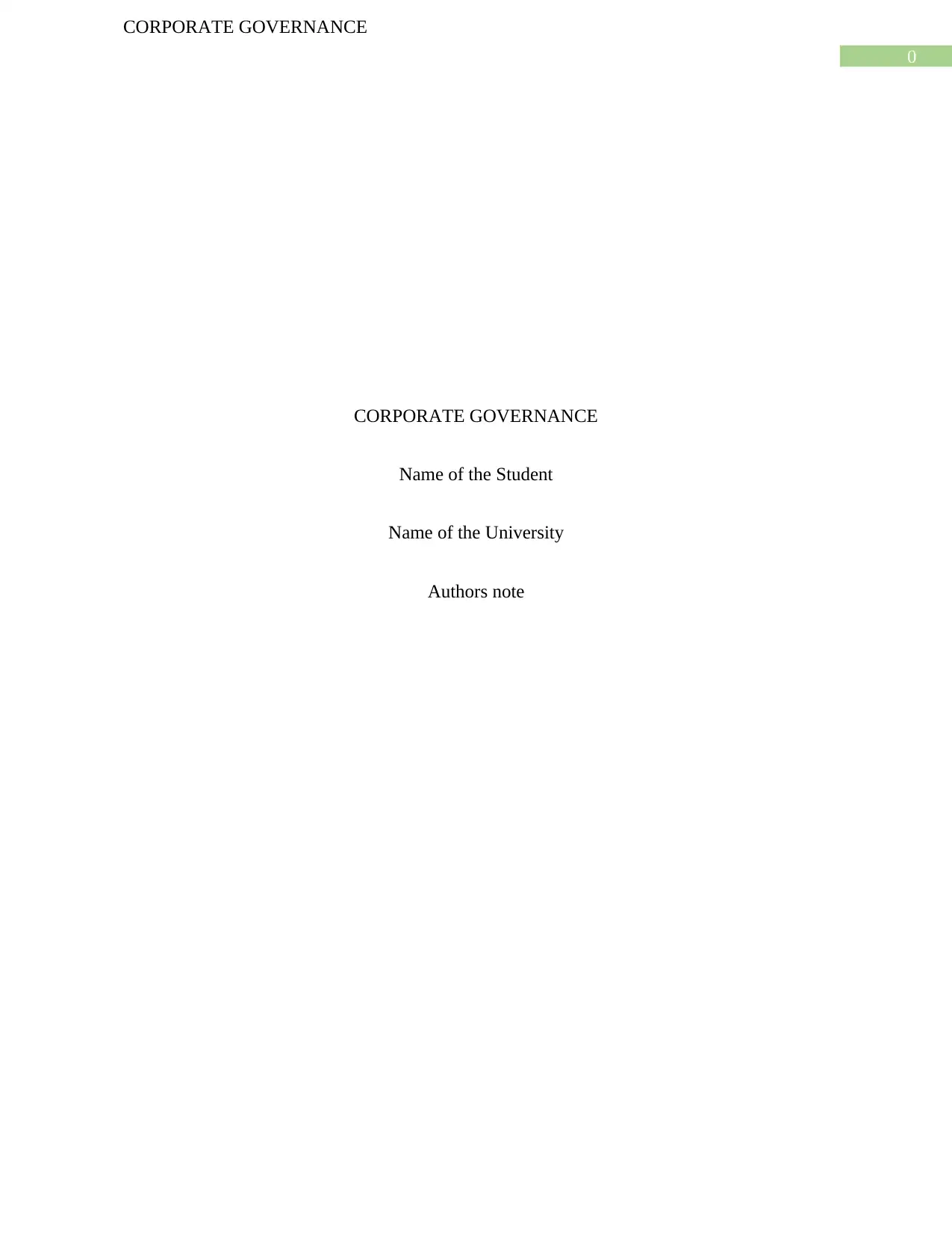
0
CORPORATE GOVERNANCE
CORPORATE GOVERNANCE
Name of the Student
Name of the University
Authors note
CORPORATE GOVERNANCE
CORPORATE GOVERNANCE
Name of the Student
Name of the University
Authors note
Secure Best Marks with AI Grader
Need help grading? Try our AI Grader for instant feedback on your assignments.
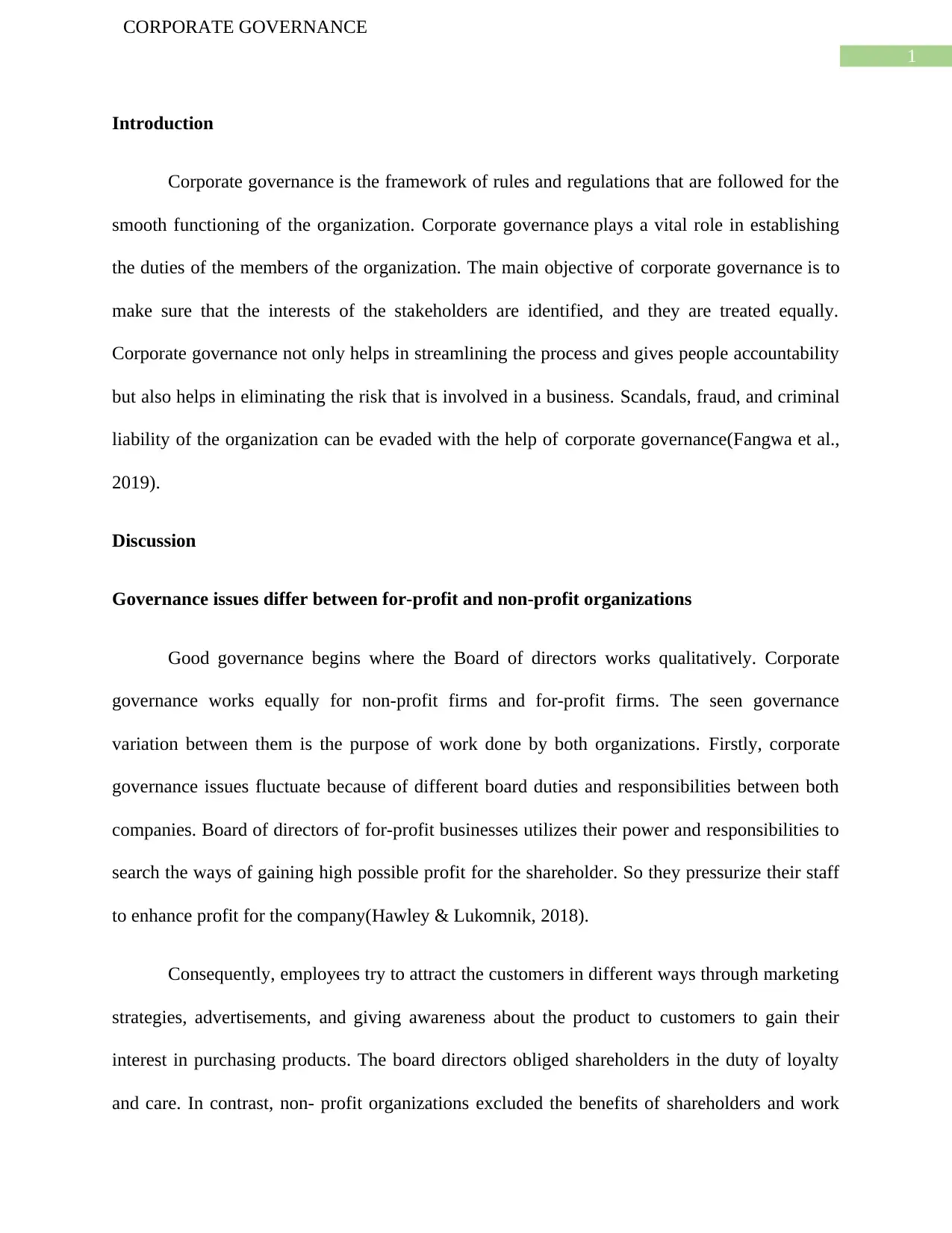
1
CORPORATE GOVERNANCE
Introduction
Corporate governance is the framework of rules and regulations that are followed for the
smooth functioning of the organization. Corporate governance plays a vital role in establishing
the duties of the members of the organization. The main objective of corporate governance is to
make sure that the interests of the stakeholders are identified, and they are treated equally.
Corporate governance not only helps in streamlining the process and gives people accountability
but also helps in eliminating the risk that is involved in a business. Scandals, fraud, and criminal
liability of the organization can be evaded with the help of corporate governance(Fangwa et al.,
2019).
Discussion
Governance issues differ between for-profit and non-profit organizations
Good governance begins where the Board of directors works qualitatively. Corporate
governance works equally for non-profit firms and for-profit firms. The seen governance
variation between them is the purpose of work done by both organizations. Firstly, corporate
governance issues fluctuate because of different board duties and responsibilities between both
companies. Board of directors of for-profit businesses utilizes their power and responsibilities to
search the ways of gaining high possible profit for the shareholder. So they pressurize their staff
to enhance profit for the company(Hawley & Lukomnik, 2018).
Consequently, employees try to attract the customers in different ways through marketing
strategies, advertisements, and giving awareness about the product to customers to gain their
interest in purchasing products. The board directors obliged shareholders in the duty of loyalty
and care. In contrast, non- profit organizations excluded the benefits of shareholders and work
CORPORATE GOVERNANCE
Introduction
Corporate governance is the framework of rules and regulations that are followed for the
smooth functioning of the organization. Corporate governance plays a vital role in establishing
the duties of the members of the organization. The main objective of corporate governance is to
make sure that the interests of the stakeholders are identified, and they are treated equally.
Corporate governance not only helps in streamlining the process and gives people accountability
but also helps in eliminating the risk that is involved in a business. Scandals, fraud, and criminal
liability of the organization can be evaded with the help of corporate governance(Fangwa et al.,
2019).
Discussion
Governance issues differ between for-profit and non-profit organizations
Good governance begins where the Board of directors works qualitatively. Corporate
governance works equally for non-profit firms and for-profit firms. The seen governance
variation between them is the purpose of work done by both organizations. Firstly, corporate
governance issues fluctuate because of different board duties and responsibilities between both
companies. Board of directors of for-profit businesses utilizes their power and responsibilities to
search the ways of gaining high possible profit for the shareholder. So they pressurize their staff
to enhance profit for the company(Hawley & Lukomnik, 2018).
Consequently, employees try to attract the customers in different ways through marketing
strategies, advertisements, and giving awareness about the product to customers to gain their
interest in purchasing products. The board directors obliged shareholders in the duty of loyalty
and care. In contrast, non- profit organizations excluded the benefits of shareholders and work
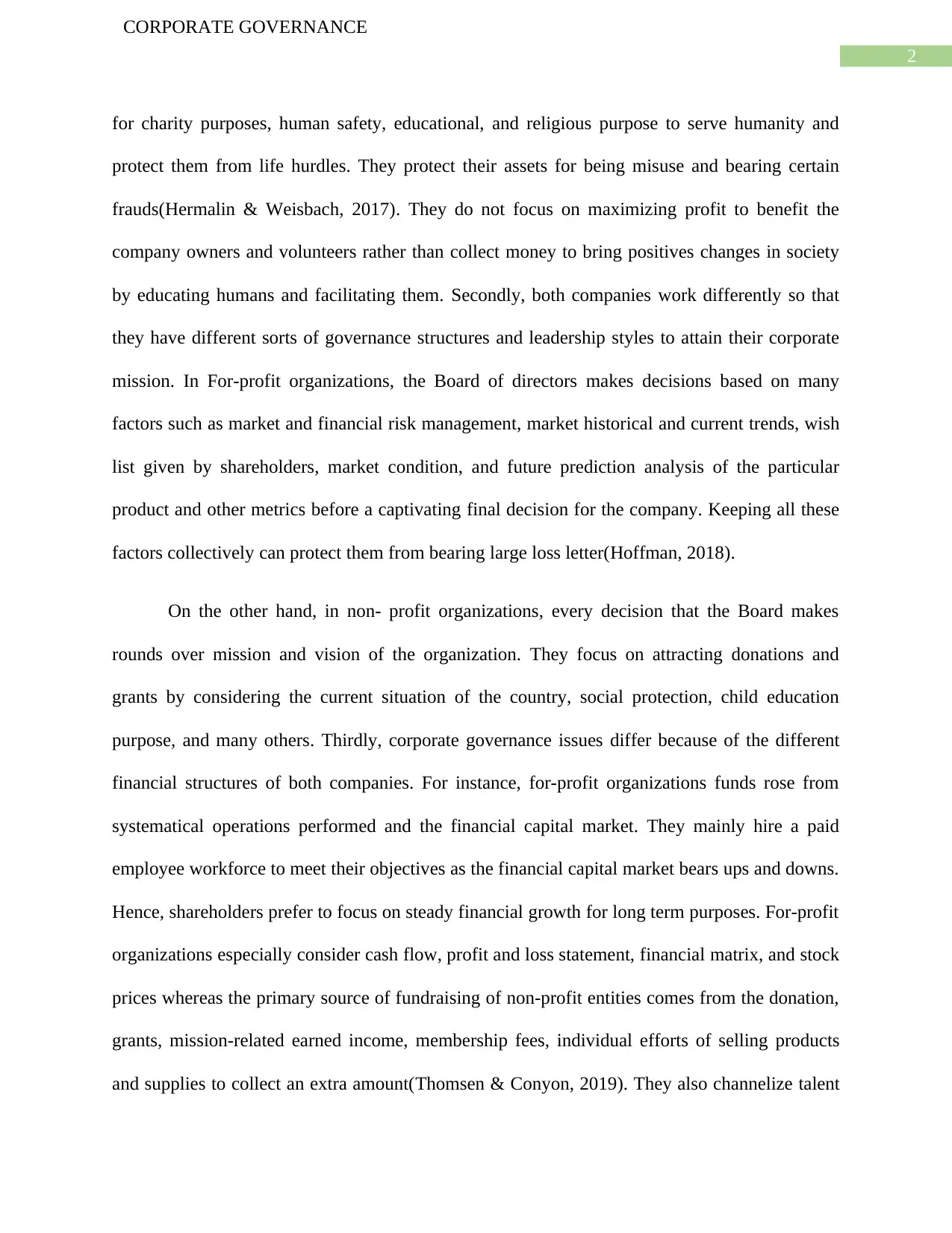
2
CORPORATE GOVERNANCE
for charity purposes, human safety, educational, and religious purpose to serve humanity and
protect them from life hurdles. They protect their assets for being misuse and bearing certain
frauds(Hermalin & Weisbach, 2017). They do not focus on maximizing profit to benefit the
company owners and volunteers rather than collect money to bring positives changes in society
by educating humans and facilitating them. Secondly, both companies work differently so that
they have different sorts of governance structures and leadership styles to attain their corporate
mission. In For-profit organizations, the Board of directors makes decisions based on many
factors such as market and financial risk management, market historical and current trends, wish
list given by shareholders, market condition, and future prediction analysis of the particular
product and other metrics before a captivating final decision for the company. Keeping all these
factors collectively can protect them from bearing large loss letter(Hoffman, 2018).
On the other hand, in non- profit organizations, every decision that the Board makes
rounds over mission and vision of the organization. They focus on attracting donations and
grants by considering the current situation of the country, social protection, child education
purpose, and many others. Thirdly, corporate governance issues differ because of the different
financial structures of both companies. For instance, for-profit organizations funds rose from
systematical operations performed and the financial capital market. They mainly hire a paid
employee workforce to meet their objectives as the financial capital market bears ups and downs.
Hence, shareholders prefer to focus on steady financial growth for long term purposes. For-profit
organizations especially consider cash flow, profit and loss statement, financial matrix, and stock
prices whereas the primary source of fundraising of non-profit entities comes from the donation,
grants, mission-related earned income, membership fees, individual efforts of selling products
and supplies to collect an extra amount(Thomsen & Conyon, 2019). They also channelize talent
CORPORATE GOVERNANCE
for charity purposes, human safety, educational, and religious purpose to serve humanity and
protect them from life hurdles. They protect their assets for being misuse and bearing certain
frauds(Hermalin & Weisbach, 2017). They do not focus on maximizing profit to benefit the
company owners and volunteers rather than collect money to bring positives changes in society
by educating humans and facilitating them. Secondly, both companies work differently so that
they have different sorts of governance structures and leadership styles to attain their corporate
mission. In For-profit organizations, the Board of directors makes decisions based on many
factors such as market and financial risk management, market historical and current trends, wish
list given by shareholders, market condition, and future prediction analysis of the particular
product and other metrics before a captivating final decision for the company. Keeping all these
factors collectively can protect them from bearing large loss letter(Hoffman, 2018).
On the other hand, in non- profit organizations, every decision that the Board makes
rounds over mission and vision of the organization. They focus on attracting donations and
grants by considering the current situation of the country, social protection, child education
purpose, and many others. Thirdly, corporate governance issues differ because of the different
financial structures of both companies. For instance, for-profit organizations funds rose from
systematical operations performed and the financial capital market. They mainly hire a paid
employee workforce to meet their objectives as the financial capital market bears ups and downs.
Hence, shareholders prefer to focus on steady financial growth for long term purposes. For-profit
organizations especially consider cash flow, profit and loss statement, financial matrix, and stock
prices whereas the primary source of fundraising of non-profit entities comes from the donation,
grants, mission-related earned income, membership fees, individual efforts of selling products
and supplies to collect an extra amount(Thomsen & Conyon, 2019). They also channelize talent
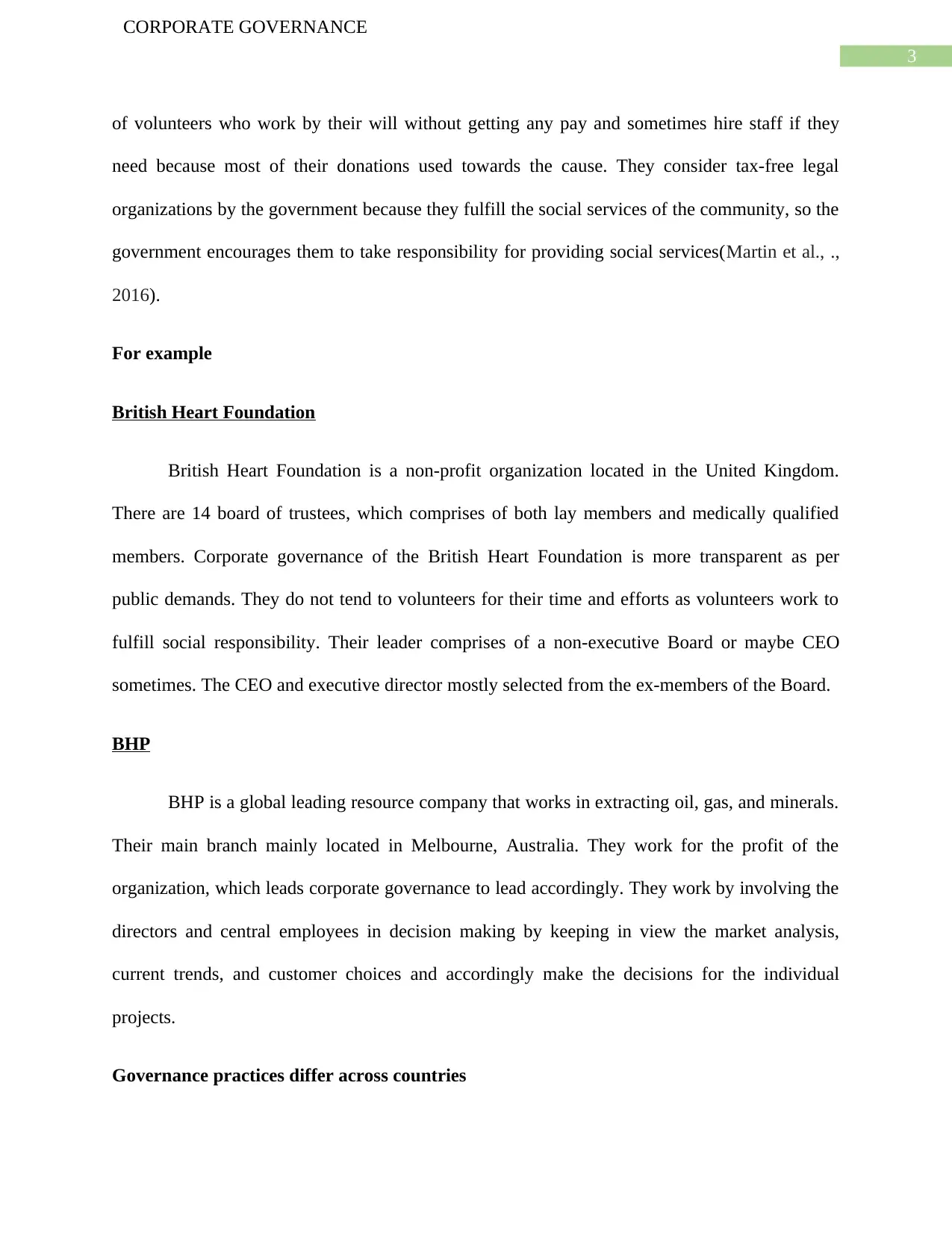
3
CORPORATE GOVERNANCE
of volunteers who work by their will without getting any pay and sometimes hire staff if they
need because most of their donations used towards the cause. They consider tax-free legal
organizations by the government because they fulfill the social services of the community, so the
government encourages them to take responsibility for providing social services(Martin et al., .,
2016).
For example
British Heart Foundation
British Heart Foundation is a non-profit organization located in the United Kingdom.
There are 14 board of trustees, which comprises of both lay members and medically qualified
members. Corporate governance of the British Heart Foundation is more transparent as per
public demands. They do not tend to volunteers for their time and efforts as volunteers work to
fulfill social responsibility. Their leader comprises of a non-executive Board or maybe CEO
sometimes. The CEO and executive director mostly selected from the ex-members of the Board.
BHP
BHP is a global leading resource company that works in extracting oil, gas, and minerals.
Their main branch mainly located in Melbourne, Australia. They work for the profit of the
organization, which leads corporate governance to lead accordingly. They work by involving the
directors and central employees in decision making by keeping in view the market analysis,
current trends, and customer choices and accordingly make the decisions for the individual
projects.
Governance practices differ across countries
CORPORATE GOVERNANCE
of volunteers who work by their will without getting any pay and sometimes hire staff if they
need because most of their donations used towards the cause. They consider tax-free legal
organizations by the government because they fulfill the social services of the community, so the
government encourages them to take responsibility for providing social services(Martin et al., .,
2016).
For example
British Heart Foundation
British Heart Foundation is a non-profit organization located in the United Kingdom.
There are 14 board of trustees, which comprises of both lay members and medically qualified
members. Corporate governance of the British Heart Foundation is more transparent as per
public demands. They do not tend to volunteers for their time and efforts as volunteers work to
fulfill social responsibility. Their leader comprises of a non-executive Board or maybe CEO
sometimes. The CEO and executive director mostly selected from the ex-members of the Board.
BHP
BHP is a global leading resource company that works in extracting oil, gas, and minerals.
Their main branch mainly located in Melbourne, Australia. They work for the profit of the
organization, which leads corporate governance to lead accordingly. They work by involving the
directors and central employees in decision making by keeping in view the market analysis,
current trends, and customer choices and accordingly make the decisions for the individual
projects.
Governance practices differ across countries
Secure Best Marks with AI Grader
Need help grading? Try our AI Grader for instant feedback on your assignments.
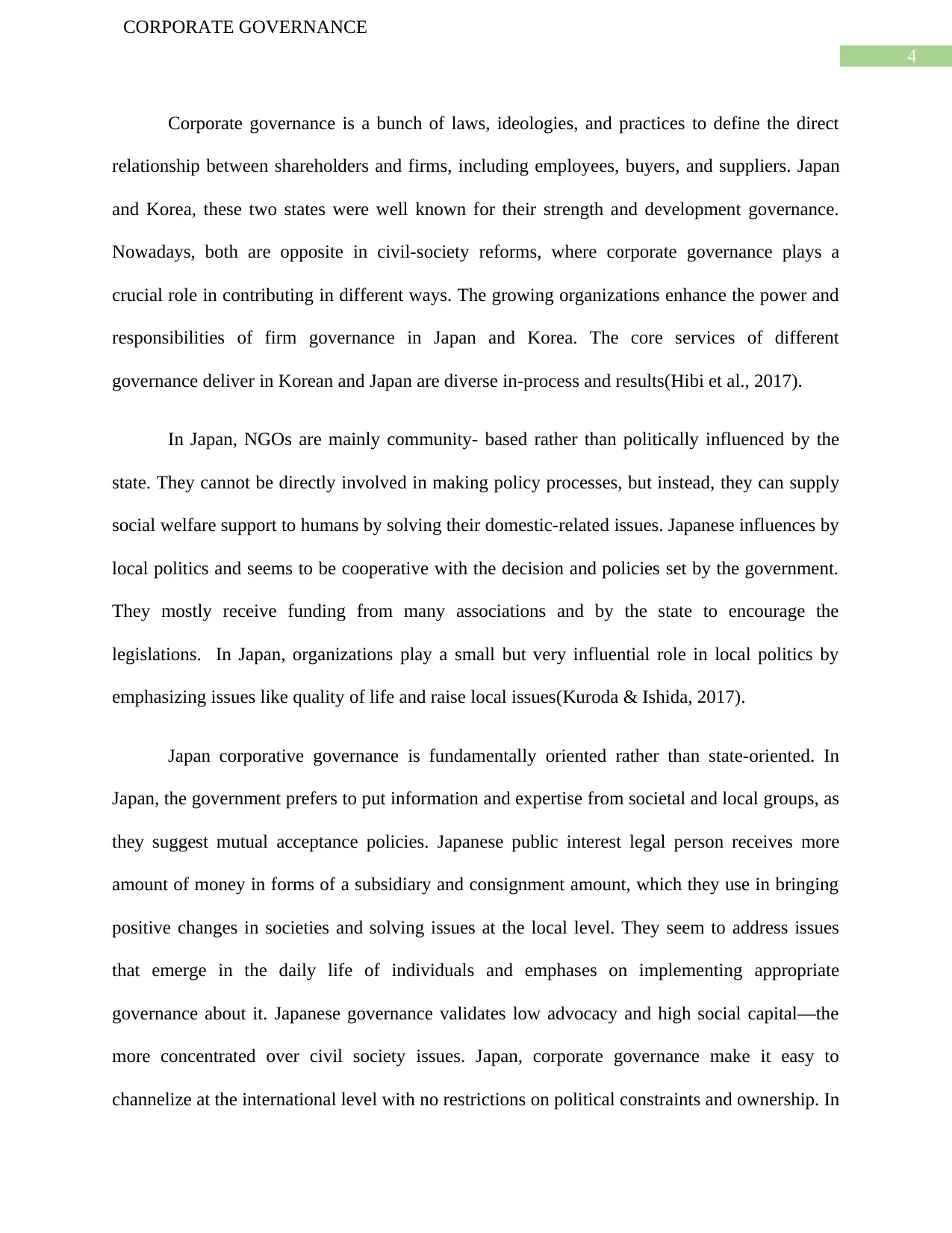
4
CORPORATE GOVERNANCE
Corporate governance is a bunch of laws, ideologies, and practices to define the direct
relationship between shareholders and firms, including employees, buyers, and suppliers. Japan
and Korea, these two states were well known for their strength and development governance.
Nowadays, both are opposite in civil-society reforms, where corporate governance plays a
crucial role in contributing in different ways. The growing organizations enhance the power and
responsibilities of firm governance in Japan and Korea. The core services of different
governance deliver in Korean and Japan are diverse in-process and results(Hibi et al., 2017).
In Japan, NGOs are mainly community- based rather than politically influenced by the
state. They cannot be directly involved in making policy processes, but instead, they can supply
social welfare support to humans by solving their domestic-related issues. Japanese influences by
local politics and seems to be cooperative with the decision and policies set by the government.
They mostly receive funding from many associations and by the state to encourage the
legislations. In Japan, organizations play a small but very influential role in local politics by
emphasizing issues like quality of life and raise local issues(Kuroda & Ishida, 2017).
Japan corporative governance is fundamentally oriented rather than state-oriented. In
Japan, the government prefers to put information and expertise from societal and local groups, as
they suggest mutual acceptance policies. Japanese public interest legal person receives more
amount of money in forms of a subsidiary and consignment amount, which they use in bringing
positive changes in societies and solving issues at the local level. They seem to address issues
that emerge in the daily life of individuals and emphases on implementing appropriate
governance about it. Japanese governance validates low advocacy and high social capital—the
more concentrated over civil society issues. Japan, corporate governance make it easy to
channelize at the international level with no restrictions on political constraints and ownership. In
CORPORATE GOVERNANCE
Corporate governance is a bunch of laws, ideologies, and practices to define the direct
relationship between shareholders and firms, including employees, buyers, and suppliers. Japan
and Korea, these two states were well known for their strength and development governance.
Nowadays, both are opposite in civil-society reforms, where corporate governance plays a
crucial role in contributing in different ways. The growing organizations enhance the power and
responsibilities of firm governance in Japan and Korea. The core services of different
governance deliver in Korean and Japan are diverse in-process and results(Hibi et al., 2017).
In Japan, NGOs are mainly community- based rather than politically influenced by the
state. They cannot be directly involved in making policy processes, but instead, they can supply
social welfare support to humans by solving their domestic-related issues. Japanese influences by
local politics and seems to be cooperative with the decision and policies set by the government.
They mostly receive funding from many associations and by the state to encourage the
legislations. In Japan, organizations play a small but very influential role in local politics by
emphasizing issues like quality of life and raise local issues(Kuroda & Ishida, 2017).
Japan corporative governance is fundamentally oriented rather than state-oriented. In
Japan, the government prefers to put information and expertise from societal and local groups, as
they suggest mutual acceptance policies. Japanese public interest legal person receives more
amount of money in forms of a subsidiary and consignment amount, which they use in bringing
positive changes in societies and solving issues at the local level. They seem to address issues
that emerge in the daily life of individuals and emphases on implementing appropriate
governance about it. Japanese governance validates low advocacy and high social capital—the
more concentrated over civil society issues. Japan, corporate governance make it easy to
channelize at the international level with no restrictions on political constraints and ownership. In
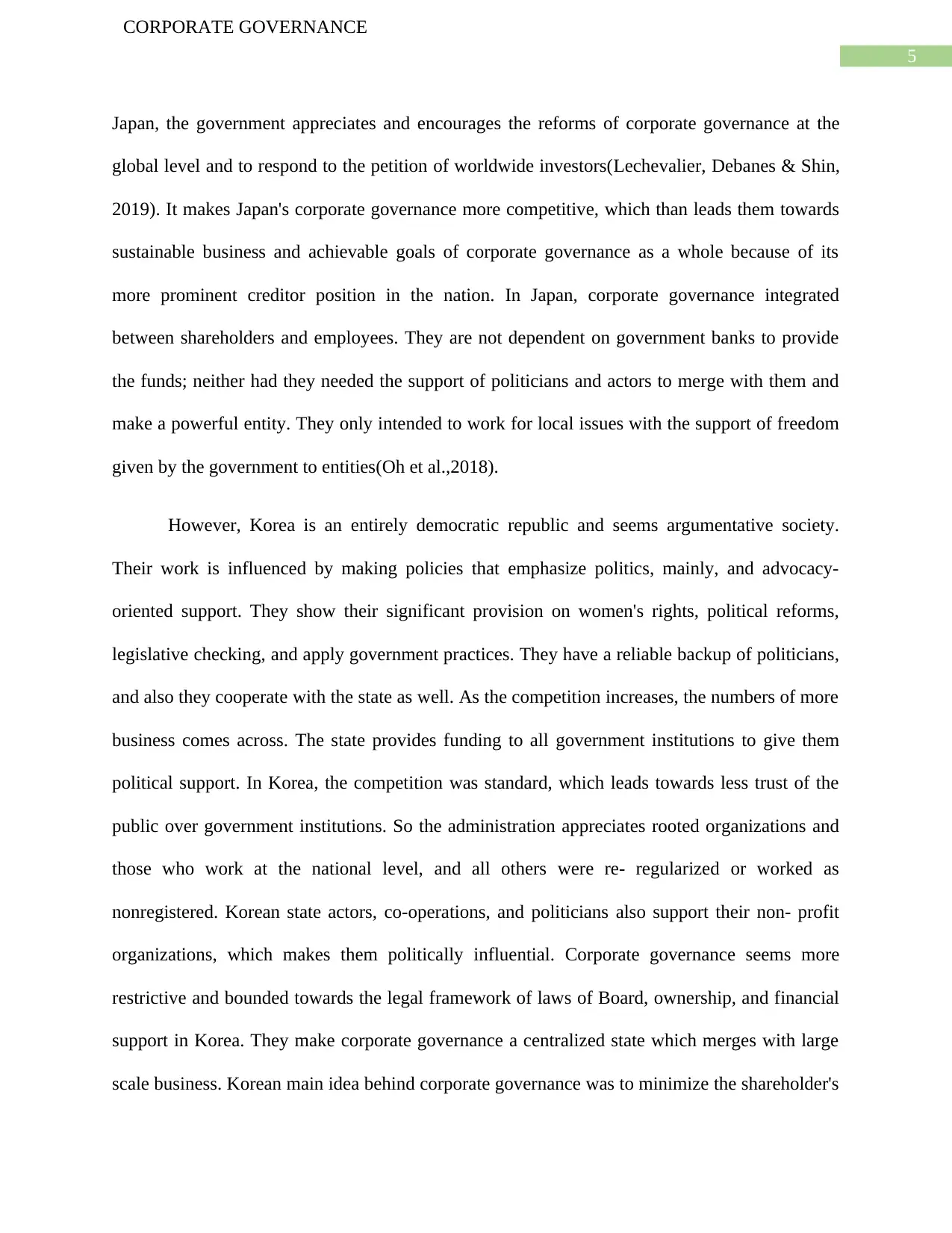
5
CORPORATE GOVERNANCE
Japan, the government appreciates and encourages the reforms of corporate governance at the
global level and to respond to the petition of worldwide investors(Lechevalier, Debanes & Shin,
2019). It makes Japan's corporate governance more competitive, which than leads them towards
sustainable business and achievable goals of corporate governance as a whole because of its
more prominent creditor position in the nation. In Japan, corporate governance integrated
between shareholders and employees. They are not dependent on government banks to provide
the funds; neither had they needed the support of politicians and actors to merge with them and
make a powerful entity. They only intended to work for local issues with the support of freedom
given by the government to entities(Oh et al.,2018).
However, Korea is an entirely democratic republic and seems argumentative society.
Their work is influenced by making policies that emphasize politics, mainly, and advocacy-
oriented support. They show their significant provision on women's rights, political reforms,
legislative checking, and apply government practices. They have a reliable backup of politicians,
and also they cooperate with the state as well. As the competition increases, the numbers of more
business comes across. The state provides funding to all government institutions to give them
political support. In Korea, the competition was standard, which leads towards less trust of the
public over government institutions. So the administration appreciates rooted organizations and
those who work at the national level, and all others were re- regularized or worked as
nonregistered. Korean state actors, co-operations, and politicians also support their non- profit
organizations, which makes them politically influential. Corporate governance seems more
restrictive and bounded towards the legal framework of laws of Board, ownership, and financial
support in Korea. They make corporate governance a centralized state which merges with large
scale business. Korean main idea behind corporate governance was to minimize the shareholder's
CORPORATE GOVERNANCE
Japan, the government appreciates and encourages the reforms of corporate governance at the
global level and to respond to the petition of worldwide investors(Lechevalier, Debanes & Shin,
2019). It makes Japan's corporate governance more competitive, which than leads them towards
sustainable business and achievable goals of corporate governance as a whole because of its
more prominent creditor position in the nation. In Japan, corporate governance integrated
between shareholders and employees. They are not dependent on government banks to provide
the funds; neither had they needed the support of politicians and actors to merge with them and
make a powerful entity. They only intended to work for local issues with the support of freedom
given by the government to entities(Oh et al.,2018).
However, Korea is an entirely democratic republic and seems argumentative society.
Their work is influenced by making policies that emphasize politics, mainly, and advocacy-
oriented support. They show their significant provision on women's rights, political reforms,
legislative checking, and apply government practices. They have a reliable backup of politicians,
and also they cooperate with the state as well. As the competition increases, the numbers of more
business comes across. The state provides funding to all government institutions to give them
political support. In Korea, the competition was standard, which leads towards less trust of the
public over government institutions. So the administration appreciates rooted organizations and
those who work at the national level, and all others were re- regularized or worked as
nonregistered. Korean state actors, co-operations, and politicians also support their non- profit
organizations, which makes them politically influential. Corporate governance seems more
restrictive and bounded towards the legal framework of laws of Board, ownership, and financial
support in Korea. They make corporate governance a centralized state which merges with large
scale business. Korean main idea behind corporate governance was to minimize the shareholder's
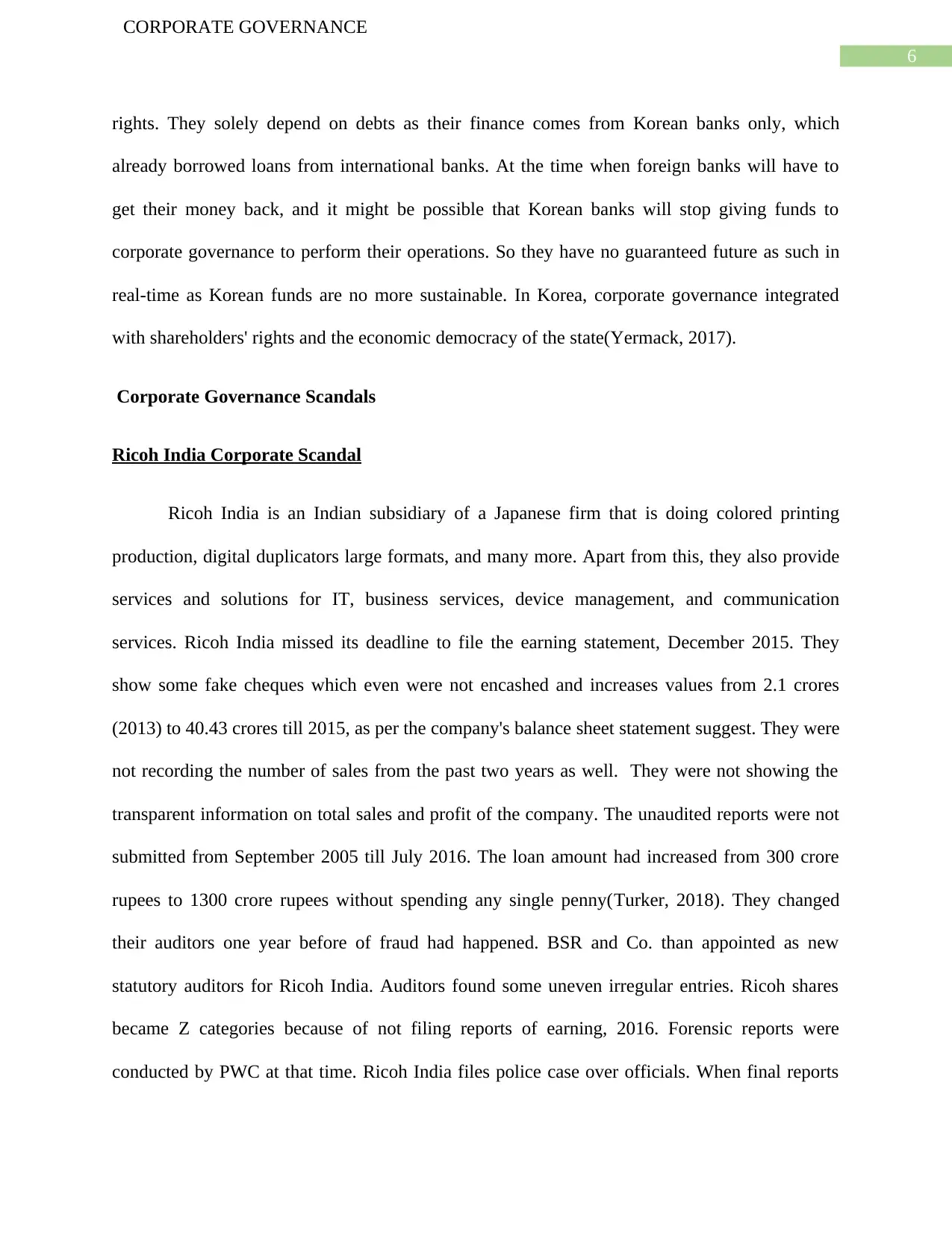
6
CORPORATE GOVERNANCE
rights. They solely depend on debts as their finance comes from Korean banks only, which
already borrowed loans from international banks. At the time when foreign banks will have to
get their money back, and it might be possible that Korean banks will stop giving funds to
corporate governance to perform their operations. So they have no guaranteed future as such in
real-time as Korean funds are no more sustainable. In Korea, corporate governance integrated
with shareholders' rights and the economic democracy of the state(Yermack, 2017).
Corporate Governance Scandals
Ricoh India Corporate Scandal
Ricoh India is an Indian subsidiary of a Japanese firm that is doing colored printing
production, digital duplicators large formats, and many more. Apart from this, they also provide
services and solutions for IT, business services, device management, and communication
services. Ricoh India missed its deadline to file the earning statement, December 2015. They
show some fake cheques which even were not encashed and increases values from 2.1 crores
(2013) to 40.43 crores till 2015, as per the company's balance sheet statement suggest. They were
not recording the number of sales from the past two years as well. They were not showing the
transparent information on total sales and profit of the company. The unaudited reports were not
submitted from September 2005 till July 2016. The loan amount had increased from 300 crore
rupees to 1300 crore rupees without spending any single penny(Turker, 2018). They changed
their auditors one year before of fraud had happened. BSR and Co. than appointed as new
statutory auditors for Ricoh India. Auditors found some uneven irregular entries. Ricoh shares
became Z categories because of not filing reports of earning, 2016. Forensic reports were
conducted by PWC at that time. Ricoh India files police case over officials. When final reports
CORPORATE GOVERNANCE
rights. They solely depend on debts as their finance comes from Korean banks only, which
already borrowed loans from international banks. At the time when foreign banks will have to
get their money back, and it might be possible that Korean banks will stop giving funds to
corporate governance to perform their operations. So they have no guaranteed future as such in
real-time as Korean funds are no more sustainable. In Korea, corporate governance integrated
with shareholders' rights and the economic democracy of the state(Yermack, 2017).
Corporate Governance Scandals
Ricoh India Corporate Scandal
Ricoh India is an Indian subsidiary of a Japanese firm that is doing colored printing
production, digital duplicators large formats, and many more. Apart from this, they also provide
services and solutions for IT, business services, device management, and communication
services. Ricoh India missed its deadline to file the earning statement, December 2015. They
show some fake cheques which even were not encashed and increases values from 2.1 crores
(2013) to 40.43 crores till 2015, as per the company's balance sheet statement suggest. They were
not recording the number of sales from the past two years as well. They were not showing the
transparent information on total sales and profit of the company. The unaudited reports were not
submitted from September 2005 till July 2016. The loan amount had increased from 300 crore
rupees to 1300 crore rupees without spending any single penny(Turker, 2018). They changed
their auditors one year before of fraud had happened. BSR and Co. than appointed as new
statutory auditors for Ricoh India. Auditors found some uneven irregular entries. Ricoh shares
became Z categories because of not filing reports of earning, 2016. Forensic reports were
conducted by PWC at that time. Ricoh India files police case over officials. When final reports
Paraphrase This Document
Need a fresh take? Get an instant paraphrase of this document with our AI Paraphraser
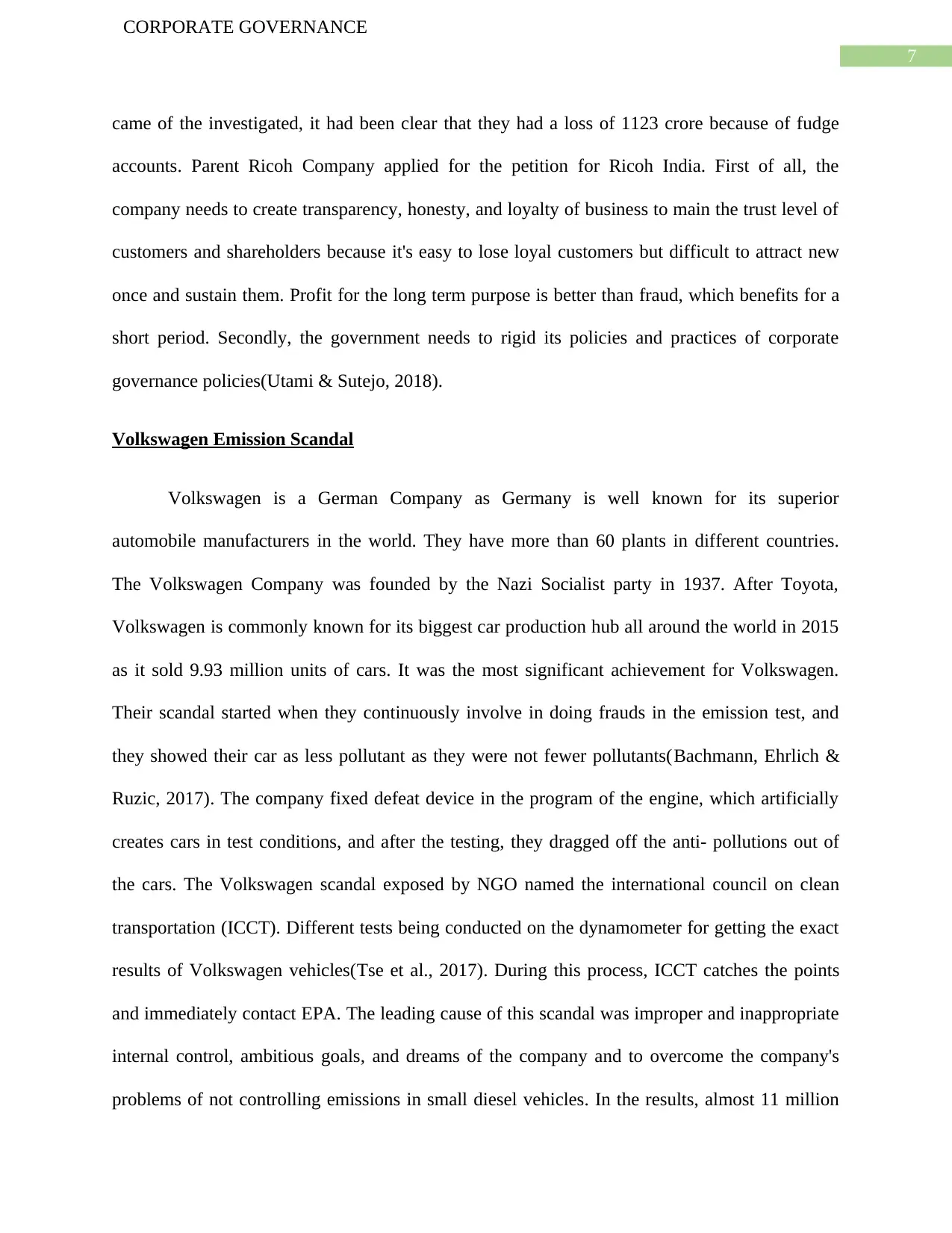
7
CORPORATE GOVERNANCE
came of the investigated, it had been clear that they had a loss of 1123 crore because of fudge
accounts. Parent Ricoh Company applied for the petition for Ricoh India. First of all, the
company needs to create transparency, honesty, and loyalty of business to main the trust level of
customers and shareholders because it's easy to lose loyal customers but difficult to attract new
once and sustain them. Profit for the long term purpose is better than fraud, which benefits for a
short period. Secondly, the government needs to rigid its policies and practices of corporate
governance policies(Utami & Sutejo, 2018).
Volkswagen Emission Scandal
Volkswagen is a German Company as Germany is well known for its superior
automobile manufacturers in the world. They have more than 60 plants in different countries.
The Volkswagen Company was founded by the Nazi Socialist party in 1937. After Toyota,
Volkswagen is commonly known for its biggest car production hub all around the world in 2015
as it sold 9.93 million units of cars. It was the most significant achievement for Volkswagen.
Their scandal started when they continuously involve in doing frauds in the emission test, and
they showed their car as less pollutant as they were not fewer pollutants(Bachmann, Ehrlich &
Ruzic, 2017). The company fixed defeat device in the program of the engine, which artificially
creates cars in test conditions, and after the testing, they dragged off the anti- pollutions out of
the cars. The Volkswagen scandal exposed by NGO named the international council on clean
transportation (ICCT). Different tests being conducted on the dynamometer for getting the exact
results of Volkswagen vehicles(Tse et al., 2017). During this process, ICCT catches the points
and immediately contact EPA. The leading cause of this scandal was improper and inappropriate
internal control, ambitious goals, and dreams of the company and to overcome the company's
problems of not controlling emissions in small diesel vehicles. In the results, almost 11 million
CORPORATE GOVERNANCE
came of the investigated, it had been clear that they had a loss of 1123 crore because of fudge
accounts. Parent Ricoh Company applied for the petition for Ricoh India. First of all, the
company needs to create transparency, honesty, and loyalty of business to main the trust level of
customers and shareholders because it's easy to lose loyal customers but difficult to attract new
once and sustain them. Profit for the long term purpose is better than fraud, which benefits for a
short period. Secondly, the government needs to rigid its policies and practices of corporate
governance policies(Utami & Sutejo, 2018).
Volkswagen Emission Scandal
Volkswagen is a German Company as Germany is well known for its superior
automobile manufacturers in the world. They have more than 60 plants in different countries.
The Volkswagen Company was founded by the Nazi Socialist party in 1937. After Toyota,
Volkswagen is commonly known for its biggest car production hub all around the world in 2015
as it sold 9.93 million units of cars. It was the most significant achievement for Volkswagen.
Their scandal started when they continuously involve in doing frauds in the emission test, and
they showed their car as less pollutant as they were not fewer pollutants(Bachmann, Ehrlich &
Ruzic, 2017). The company fixed defeat device in the program of the engine, which artificially
creates cars in test conditions, and after the testing, they dragged off the anti- pollutions out of
the cars. The Volkswagen scandal exposed by NGO named the international council on clean
transportation (ICCT). Different tests being conducted on the dynamometer for getting the exact
results of Volkswagen vehicles(Tse et al., 2017). During this process, ICCT catches the points
and immediately contact EPA. The leading cause of this scandal was improper and inappropriate
internal control, ambitious goals, and dreams of the company and to overcome the company's
problems of not controlling emissions in small diesel vehicles. In the results, almost 11 million
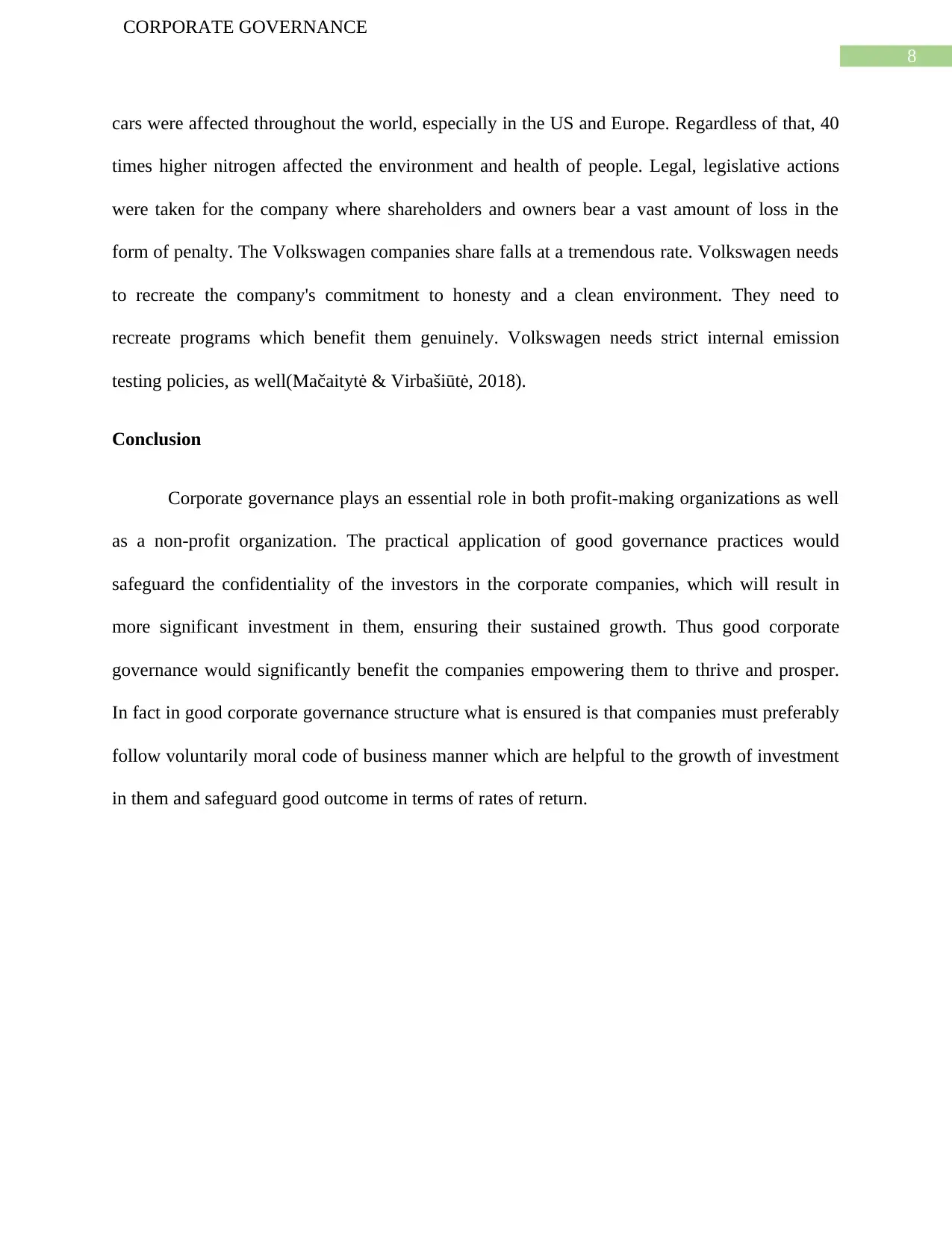
8
CORPORATE GOVERNANCE
cars were affected throughout the world, especially in the US and Europe. Regardless of that, 40
times higher nitrogen affected the environment and health of people. Legal, legislative actions
were taken for the company where shareholders and owners bear a vast amount of loss in the
form of penalty. The Volkswagen companies share falls at a tremendous rate. Volkswagen needs
to recreate the company's commitment to honesty and a clean environment. They need to
recreate programs which benefit them genuinely. Volkswagen needs strict internal emission
testing policies, as well(Mačaitytė & Virbašiūtė, 2018).
Conclusion
Corporate governance plays an essential role in both profit-making organizations as well
as a non-profit organization. The practical application of good governance practices would
safeguard the confidentiality of the investors in the corporate companies, which will result in
more significant investment in them, ensuring their sustained growth. Thus good corporate
governance would significantly benefit the companies empowering them to thrive and prosper.
In fact in good corporate governance structure what is ensured is that companies must preferably
follow voluntarily moral code of business manner which are helpful to the growth of investment
in them and safeguard good outcome in terms of rates of return.
CORPORATE GOVERNANCE
cars were affected throughout the world, especially in the US and Europe. Regardless of that, 40
times higher nitrogen affected the environment and health of people. Legal, legislative actions
were taken for the company where shareholders and owners bear a vast amount of loss in the
form of penalty. The Volkswagen companies share falls at a tremendous rate. Volkswagen needs
to recreate the company's commitment to honesty and a clean environment. They need to
recreate programs which benefit them genuinely. Volkswagen needs strict internal emission
testing policies, as well(Mačaitytė & Virbašiūtė, 2018).
Conclusion
Corporate governance plays an essential role in both profit-making organizations as well
as a non-profit organization. The practical application of good governance practices would
safeguard the confidentiality of the investors in the corporate companies, which will result in
more significant investment in them, ensuring their sustained growth. Thus good corporate
governance would significantly benefit the companies empowering them to thrive and prosper.
In fact in good corporate governance structure what is ensured is that companies must preferably
follow voluntarily moral code of business manner which are helpful to the growth of investment
in them and safeguard good outcome in terms of rates of return.
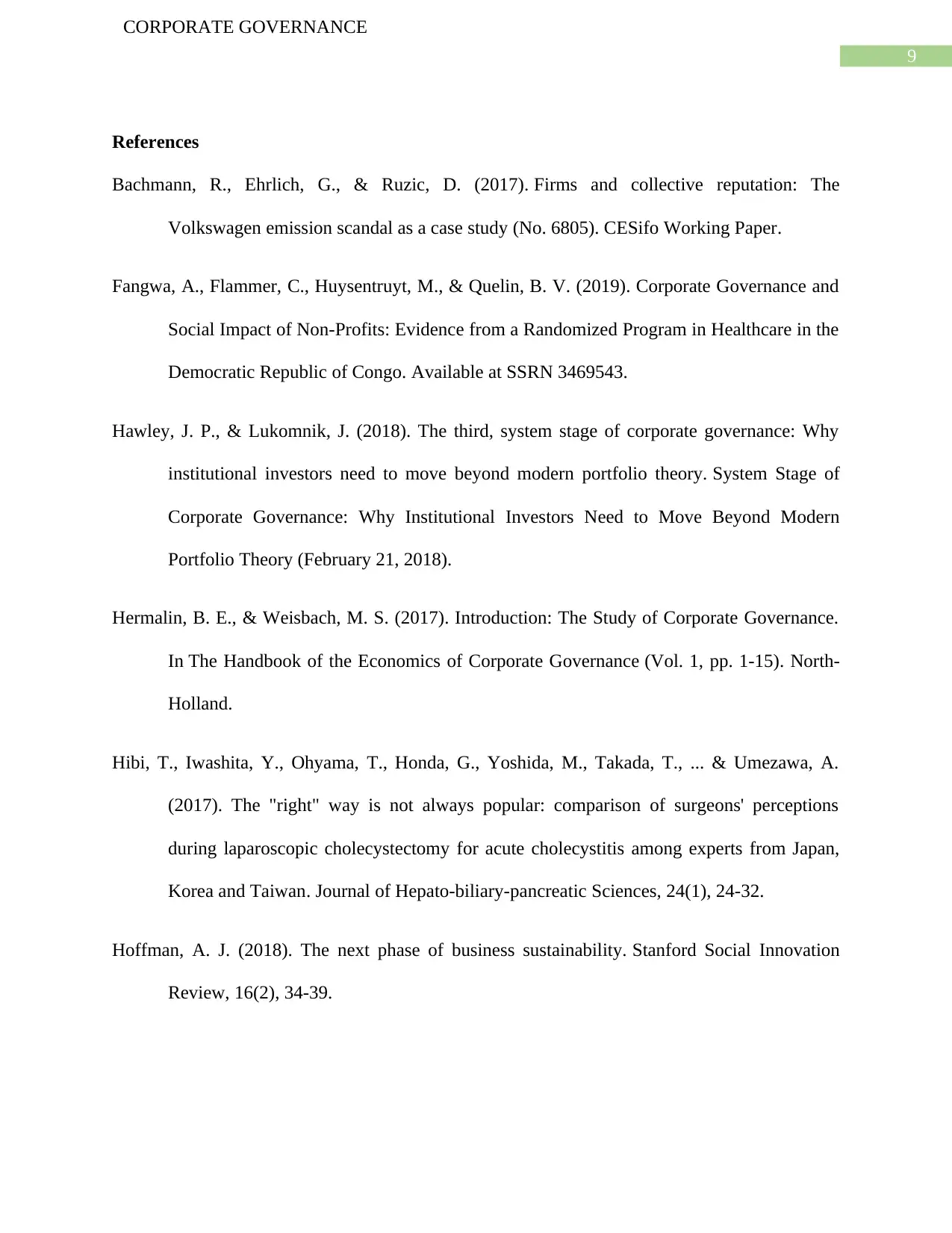
9
CORPORATE GOVERNANCE
References
Bachmann, R., Ehrlich, G., & Ruzic, D. (2017). Firms and collective reputation: The
Volkswagen emission scandal as a case study (No. 6805). CESifo Working Paper.
Fangwa, A., Flammer, C., Huysentruyt, M., & Quelin, B. V. (2019). Corporate Governance and
Social Impact of Non‐Profits: Evidence from a Randomized Program in Healthcare in the
Democratic Republic of Congo. Available at SSRN 3469543.
Hawley, J. P., & Lukomnik, J. (2018). The third, system stage of corporate governance: Why
institutional investors need to move beyond modern portfolio theory. System Stage of
Corporate Governance: Why Institutional Investors Need to Move Beyond Modern
Portfolio Theory (February 21, 2018).
Hermalin, B. E., & Weisbach, M. S. (2017). Introduction: The Study of Corporate Governance.
In The Handbook of the Economics of Corporate Governance (Vol. 1, pp. 1-15). North-
Holland.
Hibi, T., Iwashita, Y., Ohyama, T., Honda, G., Yoshida, M., Takada, T., ... & Umezawa, A.
(2017). The "right" way is not always popular: comparison of surgeons' perceptions
during laparoscopic cholecystectomy for acute cholecystitis among experts from Japan,
Korea and Taiwan. Journal of Hepato‐biliary‐pancreatic Sciences, 24(1), 24-32.
Hoffman, A. J. (2018). The next phase of business sustainability. Stanford Social Innovation
Review, 16(2), 34-39.
CORPORATE GOVERNANCE
References
Bachmann, R., Ehrlich, G., & Ruzic, D. (2017). Firms and collective reputation: The
Volkswagen emission scandal as a case study (No. 6805). CESifo Working Paper.
Fangwa, A., Flammer, C., Huysentruyt, M., & Quelin, B. V. (2019). Corporate Governance and
Social Impact of Non‐Profits: Evidence from a Randomized Program in Healthcare in the
Democratic Republic of Congo. Available at SSRN 3469543.
Hawley, J. P., & Lukomnik, J. (2018). The third, system stage of corporate governance: Why
institutional investors need to move beyond modern portfolio theory. System Stage of
Corporate Governance: Why Institutional Investors Need to Move Beyond Modern
Portfolio Theory (February 21, 2018).
Hermalin, B. E., & Weisbach, M. S. (2017). Introduction: The Study of Corporate Governance.
In The Handbook of the Economics of Corporate Governance (Vol. 1, pp. 1-15). North-
Holland.
Hibi, T., Iwashita, Y., Ohyama, T., Honda, G., Yoshida, M., Takada, T., ... & Umezawa, A.
(2017). The "right" way is not always popular: comparison of surgeons' perceptions
during laparoscopic cholecystectomy for acute cholecystitis among experts from Japan,
Korea and Taiwan. Journal of Hepato‐biliary‐pancreatic Sciences, 24(1), 24-32.
Hoffman, A. J. (2018). The next phase of business sustainability. Stanford Social Innovation
Review, 16(2), 34-39.
Secure Best Marks with AI Grader
Need help grading? Try our AI Grader for instant feedback on your assignments.
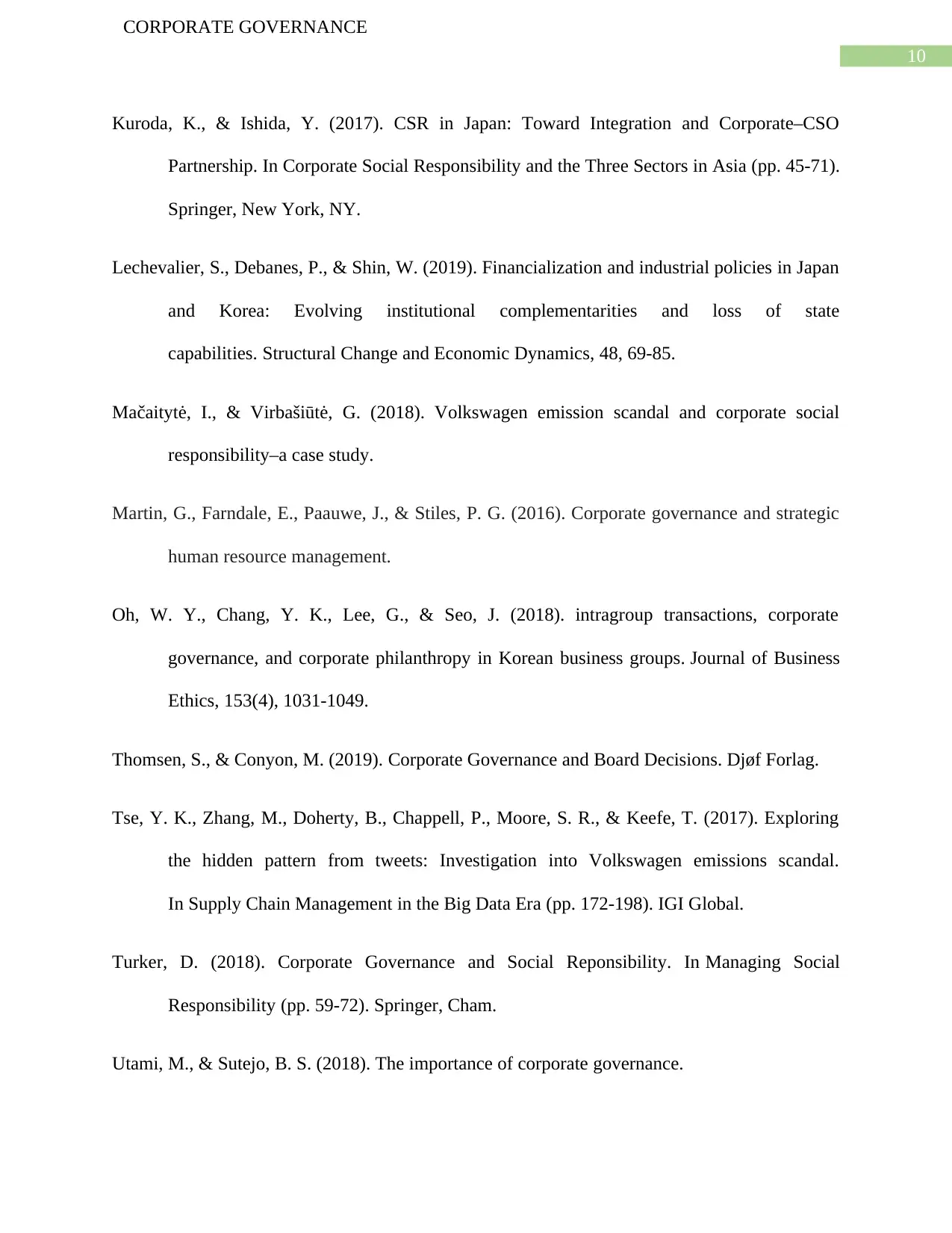
10
CORPORATE GOVERNANCE
Kuroda, K., & Ishida, Y. (2017). CSR in Japan: Toward Integration and Corporate–CSO
Partnership. In Corporate Social Responsibility and the Three Sectors in Asia (pp. 45-71).
Springer, New York, NY.
Lechevalier, S., Debanes, P., & Shin, W. (2019). Financialization and industrial policies in Japan
and Korea: Evolving institutional complementarities and loss of state
capabilities. Structural Change and Economic Dynamics, 48, 69-85.
Mačaitytė, I., & Virbašiūtė, G. (2018). Volkswagen emission scandal and corporate social
responsibility–a case study.
Martin, G., Farndale, E., Paauwe, J., & Stiles, P. G. (2016). Corporate governance and strategic
human resource management.
Oh, W. Y., Chang, Y. K., Lee, G., & Seo, J. (2018). intragroup transactions, corporate
governance, and corporate philanthropy in Korean business groups. Journal of Business
Ethics, 153(4), 1031-1049.
Thomsen, S., & Conyon, M. (2019). Corporate Governance and Board Decisions. Djøf Forlag.
Tse, Y. K., Zhang, M., Doherty, B., Chappell, P., Moore, S. R., & Keefe, T. (2017). Exploring
the hidden pattern from tweets: Investigation into Volkswagen emissions scandal.
In Supply Chain Management in the Big Data Era (pp. 172-198). IGI Global.
Turker, D. (2018). Corporate Governance and Social Reponsibility. In Managing Social
Responsibility (pp. 59-72). Springer, Cham.
Utami, M., & Sutejo, B. S. (2018). The importance of corporate governance.
CORPORATE GOVERNANCE
Kuroda, K., & Ishida, Y. (2017). CSR in Japan: Toward Integration and Corporate–CSO
Partnership. In Corporate Social Responsibility and the Three Sectors in Asia (pp. 45-71).
Springer, New York, NY.
Lechevalier, S., Debanes, P., & Shin, W. (2019). Financialization and industrial policies in Japan
and Korea: Evolving institutional complementarities and loss of state
capabilities. Structural Change and Economic Dynamics, 48, 69-85.
Mačaitytė, I., & Virbašiūtė, G. (2018). Volkswagen emission scandal and corporate social
responsibility–a case study.
Martin, G., Farndale, E., Paauwe, J., & Stiles, P. G. (2016). Corporate governance and strategic
human resource management.
Oh, W. Y., Chang, Y. K., Lee, G., & Seo, J. (2018). intragroup transactions, corporate
governance, and corporate philanthropy in Korean business groups. Journal of Business
Ethics, 153(4), 1031-1049.
Thomsen, S., & Conyon, M. (2019). Corporate Governance and Board Decisions. Djøf Forlag.
Tse, Y. K., Zhang, M., Doherty, B., Chappell, P., Moore, S. R., & Keefe, T. (2017). Exploring
the hidden pattern from tweets: Investigation into Volkswagen emissions scandal.
In Supply Chain Management in the Big Data Era (pp. 172-198). IGI Global.
Turker, D. (2018). Corporate Governance and Social Reponsibility. In Managing Social
Responsibility (pp. 59-72). Springer, Cham.
Utami, M., & Sutejo, B. S. (2018). The importance of corporate governance.

11
CORPORATE GOVERNANCE
Yermack, D. (2017). Corporate governance and blockchains. Review of Finance, 21(1), 7-31.
CORPORATE GOVERNANCE
Yermack, D. (2017). Corporate governance and blockchains. Review of Finance, 21(1), 7-31.
1 out of 12
Related Documents
Your All-in-One AI-Powered Toolkit for Academic Success.
+13062052269
info@desklib.com
Available 24*7 on WhatsApp / Email
![[object Object]](/_next/static/media/star-bottom.7253800d.svg)
Unlock your academic potential
© 2024 | Zucol Services PVT LTD | All rights reserved.





